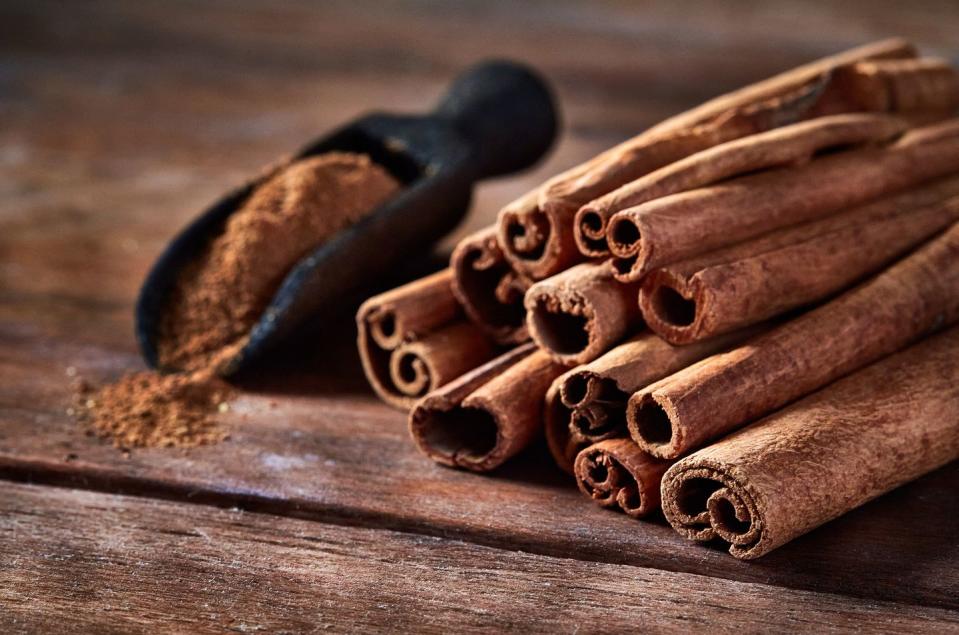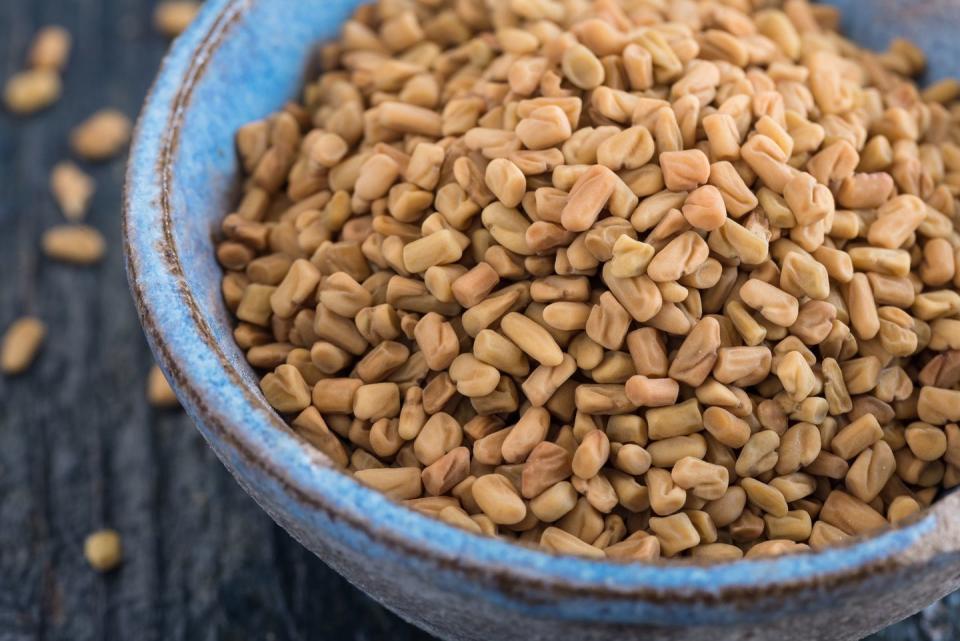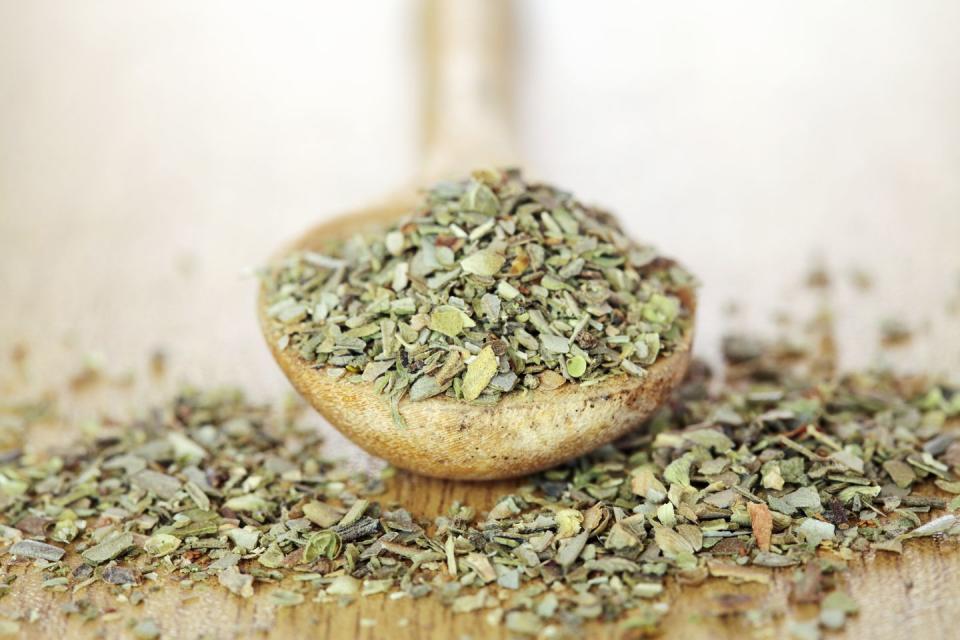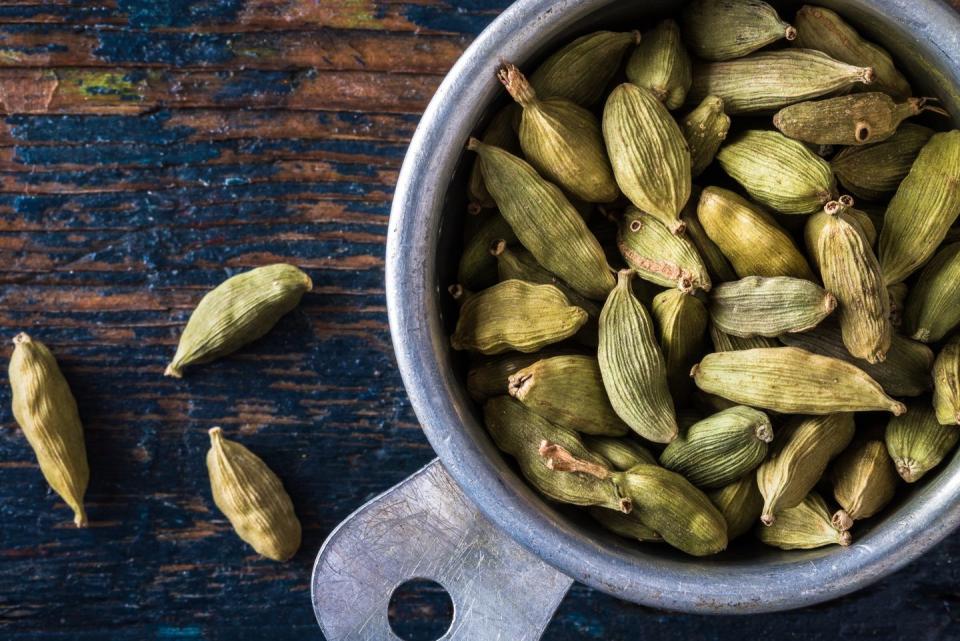Herbs And Spices Are Not The Answer To Weight Loss, But They Can Make Healthy Eating Easier
Weight loss is (and should be) a personal experience. If you're exploring tactics to make your journey easier, you may have come across mentions of using spices and herbs for weight loss.
Let's get this straight upfront: You won't see pounds coming off magically by just adding specific ingredients to your diet. “While spices may elevate fat burn, they cannot be used as a solo answer to weight loss,” says Fatima Cody Stanford, MD, MPH, an obesity medicine physician and clinical researcher at Massachusetts General Hospital.
Some spices are “known to improve metabolism, fat loss, and decrease appetite, however, they need to be coupled with other lifestyle measures—optimal diet and physical activity—to have significant impact,” she says. That means you can start sprinkling more cayenne pepper (a popular seasoning that may have some weight-loss benefits) on your favorite chicken dish, but that alone is unlikely to make a difference.
That said, spices may indirectly help you lose weight by making healthy food taste better, says Keri Gans, RD, a New York City-based nutritionist and author of The Small Change Diet. “Spices are a great way to add flavor without extra calories, hence, making a bland meal way more exciting,” she points out.
Meet the experts: Fatima Cody Stanford, MD, MPH, is an obesity medicine physician and clinical researcher at Massachusetts General Hospital. Keri Gans, RD, is a New York City-based nutritionist and author of The Small Change Diet.
There is some research to link certain herbs to weight loss, but it’s not robust. Still, if you’ve been looking to add more seasoning to your food and are curious about how it may impact your weight loss efforts, it’s understandable to have questions. These are the spices and herbs that have been linked to weight loss—and what the research actually says.
1. Cayenne Pepper

Capsaicin, the active substance of chili, may help the breakdown of fat in the body and decrease hunger by regulating hormones in the GI tract, preliminary research suggests. But more long-term studies and clinical trials are needed to confirm these benefits.
Also, like most research on herbs and spices on weight loss, the studies to this effect are small. A 2009 study of 30 people found that those who ate meals with capsaicin had lower levels of ghrelin, a hormone associated with hunger. It's not clear whether research conducted with a larger group of people would yield the same results. Worth noting, though: The researchers found that those who ate food with capsaicin did not feel any more satisfied after eating compared to the controls.
2. Turmeric

Turmeric is a spice that is known for its gorgeous marigold color, and it’s also been linked to increased fat burning and improved metabolism, Dr. Stanford says. A lot of it comes down to curcumin, which is a chemical in turmeric that has been pretty extensively studied—but, again, these are small studies.
A 2015 study in the European Review for Medical and Pharmacological Sciences had 44 people who were overweight take curcumin twice a day for a month. The participants lost nearly 5 percent of their body fat, reduced their waistline by about 4 percent, and reduced their hip circumference by 2.5 percent.
Similar results have been observed in an older animal study, in which showed mice that took curcumin supplements for about three months lost body weight and fat. (But, hey, we're not mice!)
3. Ginger

You know the drill: There are small studies to support this, but nothing major. A 2019 meta-analysis of 14 studies of people (a total of 473 subjects) who were overweight and obese found that those who supplemented with ginger lost body weight and fat. It even showed ginger could potentially lower fasting glucose and insulin resistance, which causes your body to store extra blood sugar as fat and makes weight loss more difficult.
Another analysis of 27 human and animal studies theorized that these benefits come from ginger's ability to generate heat and torch body fat, increase fat breakdown, and control appetite.
4. Cinnamon

There are a few possible pathways for how cinnamon may help with weight loss, and a lot of it comes down to its impact on your blood sugar.
A compound in cinnamon called hydroxychalcone may mimic insulin and transport sugar to your cells where it can be used as fuel, according to older research in The Journal of the American College of Nutrition. A 2009 analysis of eight studies determined that cinnamon may help stabilize blood sugar, which can end up lowering your appetite. Still, the researchers concluded that more research is needed to confirm these benefits.
5. Fenugreek

Fenugreek is a type of seed that commonly shows up in products like lactation support bars to help boost milk supply in breastfeeding moms. There is some evidence to suggest it can also help suppress appetite and potentially help with weight loss.
A 2009 study of 19 people found that those who took eight grams of fenugreek a day felt fuller and ate less than those in the placebo group. In another study, subjects consumed 17 percent less fat overall when they took a higher dose of fenugreek seed extract, but there were no significant changes in their weight or other health markers.
6. Oregano

Oregano contains an active compound called carvacrol that’s been linked to weight loss. Carvacrol may hinder fat cells from developing and accumulating in the body, per a 2012 study. Indeed, giving carvacrol to mice who were fed a high-fat diet seemed to have helped them gain less weight and fat compared to the control group in another study. Note, though, the same may not be true for humans.
7. Ginseng

Ginseng is used a lot in Eastern medicine, and small studies have linked it to weight loss. One study of 10 women with obesity who took Korean ginseng extract twice a day for eight weeks found that they lost weight. It's not clear why, but researchers think the effects are linked to the changes in the gut microbiome.
Another animal study conducted on mice with obesity found that white ginseng extract prevented fat from forming and helped delay fat being absorbed in the intestines. Again, we'll need research in people to demonstrate whether that's applicable to humans.
8. Caralluma fimbriata

In case you’re not familiar, Caralluma fimbriata is an edible cactus that originates in Asia. It's said to reduce appetite and therefore promote weight loss. A 12-week study of 33 people with overweight and obesity found that those who took Caralluma fimbriata lost more belly fat and overall weight than those who took a placebo.
An older study of 50 adult men and women found that those who took a gram of Caralluma fimbriata a day for two months lost more weight and reported being less hungry than the placebo group.
9. Black Pepper

The weight-loss benefits of black pepper are credited to piperine, an active compound found in this common household condiment. It's worth noting that so far those effects have only been seen in animal and cell studies. One study in the Indian Journal of Pharmacology found that rodents that were given piperine lost more weight on a high-fat diet compared to those that didn’t have the spice. An older lab study also linked piperine to lowered fat cell formation.
10. Cumin

There are some (small) studies that have associated cumin with better fat burning. One 2014 study of 88 women with obesity found that those who had yogurt with three grams of cumin powder daily lost more weight and had lower cholesterol levels than those ate plain yogurt. Another study of adults with overweight found that those who took a cumin supplement three times a day lost 2.2 pounds more than those in the placebo group after eight weeks.
11. Cardamom

Cardamon has been linked to weight loss but only in animals so far. One study in rats showed that those fed a high-fat diet and cardamom had less belly fat and total belly fat after 16 weeks. Another study found that 28 rodents that had cardamom powder as part of a high-fat, high-carb diet lost more belly fat than those that didn’t take the powder.
12. Gymnema sylvestre

Gymnema sylvestre contains a compound called gymnemic acid, which has been linked to decreased cravings for sweets in people with obesity. An old study from 1983 found that people who took Gymnema sylvestre felt less hungry and ended up eating less than those in the placebo group. The herb has also been linked to lowered body weight in rats on a high-fat diet.
13. Green Coffee Bean Extract

This one keeps popping up in weight-loss supps lately, and there is some science to support its use. One study of 20 healthy people found that those who had green coffee bean extract had a lowered BMI and less belly fat over two weeks, even when they didn’t otherwise change their diet. A 2011 review also found that this extract may lower a person’s body weight by 5.5 pounds, but even the researchers pointed out that the quality of the data wasn’t the best.
Ultimately, the science to support pretty much all of these claims of herbs and spices causing meaningful weight loss is weak. So, it’s best to really focus on herbs and spices to season your food. “I would recommend that people consider experimenting with spices to increase the palatability of foods and enhance their flavors,” Dr. Stanford says. “This is a great way to increase one’s vegetable intake and improve overall health.”
You Might Also Like

